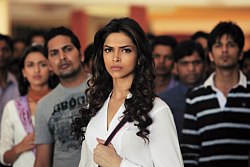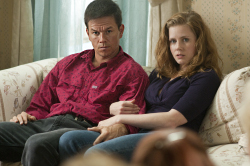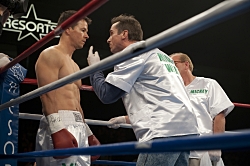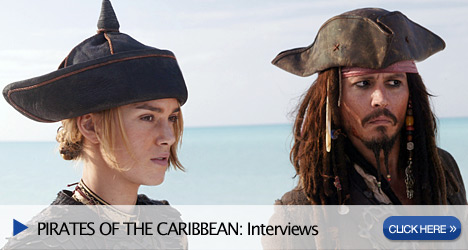A star since his 1987 movie debut in Withnail & I, in the years since Richard E Grant has appeared in a wide variety of films for directors as respected as Francis Ford Coppola, Martin Scorsese and Robert Altman. Now he has made his own directorial bow with Wah-Wah, a semi-autobiographical tale based upon his formative years in 1960s and ’70s Swaziland at the end of colonial rule.
Popular on LondonNet
Ralph Compton (Nicholas Hoult) not only has to cope with these momentous events but the changes in his family life as his mother (Miranda Richardson) begins a passionate affair that spells the end of her marriage to Harry Compton (Miranda Richardson). Harry takes the news badly and hits the bottle, emerging from each bleary eyed encounter wracked with guilt and full of apologies. Against this tumultuous backdrop Ralph grows up, experiences first love and comes to understand a little more about the world around him.
Shot on location in Swaziland, Wah-Wah boasts a starry cast that also includes Emily Watson, Julie Walters and Celia Imrie.
The film is billed as a semi-autobiographical work, can you outline where fact ends and fiction begins?
Everything in the film happened. It’s just that I’ve condensed ten years into three for the time scale of the film. Things have been shortened or dramatic licence has been taken. The most obvious being that my father died when I was 23 as opposed to when I was 15.
Given the personal significance this had for you what was the hardest thing in bringing it to the screen?
I think it was writing it, because my abiding paranoia was that there wasn’t enough story. I didn’t have enough confidence in my own story that it would sustain a whole movie. So I had a lot more subsidiary characters and sub-plots. The main casualty of that was a peace corps couple. In the early 70s, when the people who were avoiding the Vietnam draft came to Swaziland, beaded hippies, with new music and a new sensibility to drugs and everything. They were such an affront to the colonial old guard that it was a great source of confrontation and comedy, bringing rock and roll into this very staid colonial pecking order of great self importance and pomposity in such tatty circumstances. They were the main casualty because people who read the first version of the script said there were just too many characters, that I should just concentrate on the family. I asked if the family story was enough to sustain a whole movie and they said yes, I should have confidence to do that.
Were there specific scenes in the film that you found hard to direct?
Recreating my father’s funeral, certainly. It was the first day that we’d had to shoot with about 100 extras, so I was very nervous about that after having done all these intimate family scenes in the house. I was worried that I wouldn’t know what to tell them, or wouldn’t know how to choreograph the thing. I sort of lost my nerve in the morning and went back to the hotel straight after breakfast. I said to my wife, who’d just arrived, that I couldn’t do this. She’d worked as a dialogue coach on Streisand’s film Yentl and Streisand had been told by her mentor ‘one day at a time, Barbra, one day at a time’. So she said I should go out there and treat it one day at a time, one step at a time. That was helpful. I was worried I would fall apart in recreating this funeral scene, because the reality of it was so bizarre.
In what way?
There was a young priest who had just come back from an evangelical course in America, he jumped into my father’s grave, undid the lid and tried to raise him from the dead. And then he had to be consoled and hauled out of the grave because he somehow felt his faith had been not rewarded by a resurrection there and then. It was so bizarre, a Monty Python meets Joe Orton moment. We previewed the film when the editing money ran out, and without exception the response was ‘this is too bizarre’. It may be have really happened but I had to cut it out and make it a straight, conventional funeral. The point is you don’t want to suddenly be thrown off kilter, to ask yourself if you’re supposed to laugh at this. So that’ll be in the DVD Extras.
There is a very moving scene of your father in hospital being prepared for the operation that may prolong his life. How did you go about shooting that?
I wanted it to be as stylised and slightly heightened as possible. We performed the scene to this absolutely exquisite Mozart Fantasy in D Minor played on an iPod with speakers. That way everybody knew what the mood and the rhythm of the thing was before I knew what Patrick Doyle’s score was going to bring to the scene. And because there was no dialogue in there to distract or fixate on, it was a scene that was entirely to do with the emotion of recreating a man having an operation for a disease that was terminal anyway. Emily [Watson] and Nicholas [Hoult] were so emotionally distraught in this scene. Gabriel Byrne was so dignified in it, and all the hospital staff were so delicate and caring even though they were extras that it really undid me. Out of all the scenes that was the most difficult to do, I think.”
It also underlines the fact that you’ve come out of this with something that really looks like a movie, haven’t you?
That is the huge pay off of having a really experienced and talented group of people who were prepared to make a film like this which is so personal and small scale, and give it their all. They were giving it as much commitment as if the film had a £100 million budget.
Wasn’t there a hitch with you casting your first choice, About A Boy star Nicholas Hoult, to play ‘you’?
Nicholas was cast in November 2003, I cast him on the Friday and on the Monday he got cast to play Nicolas Cage’s son in The Weather Man. That was a studio film, with money in place, made by the guy who had just directed The Pirates of the Caribbean so he couldn’t not do that film. I had this awful situation where my wife, who’s a dialect coach, was phoned by Paramount Pictures asking if she could give Nicholas accent classes. If he could convince them that he was American then they’d have him. So I had this person that I’d cast to play me in a low budget film — which was still not financed — coming round to my house, my wife saying he was really brilliant at accents and that she was sure he’d get the job, which he did. I then had to re-cast and look for somebody else.
But then you lost a producer and a portion of your budget which meant he could take the role?
By the time we finally did get the money Nicholas Hoult had just completed on The Weather Man by two days, and he came and started on our film. In the interim he’d grown six inches — he was huge, six foot three — so much taller than Gabriel Byrne playing his father. But it was literally a fluke to finally get him.
There’s a scene where he sneaks underage into a screening of A Clockwork Orange which affects him deeply. Was that a significant film for you?
Oh yeah, huge. I couldn’t get over it, because I’d been obsessed with going into outer space as every 12 year old boy was in 1969, after the moon landings so Space Odyssey had been an absolutely seminal film for me. And then seeing A Clockwork Orange, I was so terrified of what I thought life would be like in England. I thought that’s what the future was. And I thought Malcolm McDowell was so mesmerising in the main role. It was forbidden fruit, you weren’t allowed to see it at that age, so sneaking in to see something like that — I can’t think of an equivalent for teenagers now. You can see anything and everything on tv and in the movies. I don’t think there’s anything that has the same impact or shock, if you think of The Exorcist or A Clockwork Orange or Last Tango In Paris. We don’t have the equivalent now.
How were your nerves on day one of shooting your first film as director?
They were so shredded by the producer meltdown we experienced, we were effectively working in Swaziland for the two weeks of pre-production without a producer. We didn’t have the work permits, medical permits, police clearances done in advance, which we were told by a producer had been done, so I was carpeted by the minister out there. Four days beforehand I was told that we couldn’t start shooting on Monday 7th, that it was illegal. I was told we’d be charged fine of a million in the local currency for doing what we had done.
How did you get around it?
On the Friday afternoon before we were due to start the King gave us clemency to have all these things processed and pay a fine. So we could start shooting on the Monday. My nerves were so shredded by that, that by the time it actually came to shooting, just being with actors and technicians in familiar territory with a script that I knew back to front, up down and sideways was a relief.
And then you have another nerve wracking experience, directing your daughter in the film. How was that?
Well I’d seen her in a school play, so I knew that she could act. She never expressed any aspirations to be an actor at all, I thought that I stood to be accused of nepotism surrounded by all these Oscar actresses. But the very qualities she has of being quite shy and not being a worldly wise and sophisticated ‘It girl’ type of person made her perfect for this part. She did that absolutely as I hoped she would.
And you even directed her first screen kiss, didn’t you?
Yeah, but I wasn’t in the room at the time! And I made it very technical. I said ‘you have to put your head here, and you do this, and put your hand on this shoulder and bump into this person with the costume and this is what’s going to happen, it’s a very small room, and the camera would be here,’ — I broke it down so that it wasn’t saliva and tongue detailed.
Has the film been screened in Swaziland?
They don’t have a cinema there any more. They had a DVD charity screening of it just before Christmas. I wasn’t there because I was doing this — ironically titled — play Otherwise Engaged in the West End. But all the reports that I got were hugely glowing, they fully endorsed it. I think 90% of the thrill for them was to see their own country and their own people on the screen.
– Peter D. Clee (May, 2006)








